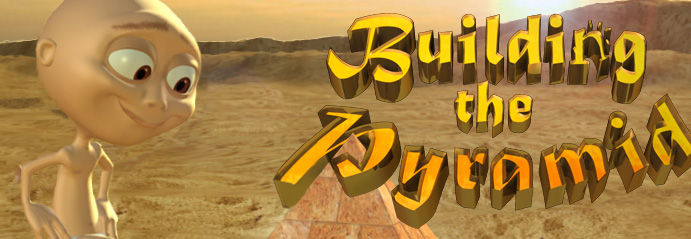Animation Mentor:
How did you come up with the concept for your short film?
Chris Clyde:
When I started writing for my short film, I took a look at what I needed from my short film. Ideally the short films we make should cover all types of animation so we can highlight it on our demo. I wrote down on my note pad the different types of animation I needed and it read something like this “subtle facial acting, physical acting, I want a character to push/pull/and lift something, and I want a character to do a little dance). Then I thought about really simple scenarios that were really appealing to me. I’ve always been fascinated with the Egyptian civilization and I wanted to do my film on it but I needed to simplify it. So I thought I’ll have 1 pharaoh, 1 slave, and a bunch of blocks in the middle of a desert. Of course the story got re-worked again and again in class but that was pretty much my thought process.
Animation Mentor:
What important lessons did you learn from making your short film?
Chris Clyde:
I learned that if you love working on your film, your work reflects that. I picked a film that was appealing to me and that made me really want to work hard on it. It’s my reason for sleepless nights and polishing different animations to make sure I got it just the way I wanted. If I had picked a project I didn’t have a lot of faith in, the love wouldn’t have been there and it might not have gotten finished in the end. I also learned that I really enjoyed the directing role. Hopefully my future journey through animation will allow me to sit in that seat once again.
Animation Mentor:
How long did it take to complete your film?
Chris Clyde:
My animation, planning, and story writing was completed in classes 5&6 so that took 6 months. My surfacing, lighting, and rendering added another 3 months. Roughly around 9 months total for my film.
Animation Mentor:
How much planning was put into your short film? Did planning help make the process easier?
Chris Clyde:
Good organization and planning is almost everything. I feel a great animator has to be equally as great at planning. This was my first short film so I got out my excel sheet and wrote down a realistic timetable for my film. It came out to about 36 weeks. Then I shortened my whole timetable by 2 weeks. That increased my workload dramatically, but also gave me 2 extra weeks just in case I needed extra time down the road. When I started animating, I also did as much video referencing and thumbnails as I could. A combination of all these things helped my work go a lot smoother.
Animation Mentor:
Do you mind sharing some of the pre-production work with us with a little explanation of what we’re looking at.
Chris Clyde:
Here’s my first animatic for my film. As you can see a lot has changed along the way. The concept and the story premise is pretty much the same, but when I started putting my ideas on paper I started seeing flaws I needed to fix.
This is my rough layout for my film. I had a lot of ground to cover so I quickly posed them accordingly in their places to see how it would all play. If I was to do it all over again, I would have spent a little extra time on rough timing.
Here’s a rough version of my film. I was getting close to the look and feel I wanted, but I decided to add a little directing change. I showed this version to people and got their feedback on it.
Animation Mentor:
What obstacles, if any, did you experience during the creation of your short film? How did you work your way around them?
Chris Clyde:
The biggest obstacle I had to face during my short film was the Southern California fires. I live in Rancho Bernardo and that area lost the most homes in the fire. My house was saved but I was forced to evacuate for a week. At 3:00 am I looked out my window and saw a wall of fire behind the hills. Afraid that all my work would be lost, I had to quickly race and back up all my work. Then I grabbed my hard drive and put a towel around it (to protect it from black smoke) and ran out to the car with it. Thankfully, my timetable left me some flexibility for some complications that came down the road. Everything's fine now, but I can say that I didn't plan for that in my schedule.
Animation Mentor:
Tell how your Animation Mentor experience helped you in creating your short film.
Chris Clyde:
The kind of professional feedback I got from my mentor and classmates acted as a cornerstone in my film. The deadlines to finish each section of my film really motivated and pushed me to finish. If an animator is going to make his or her first short film, why not have the best animators in the business help guide you through it?
|


